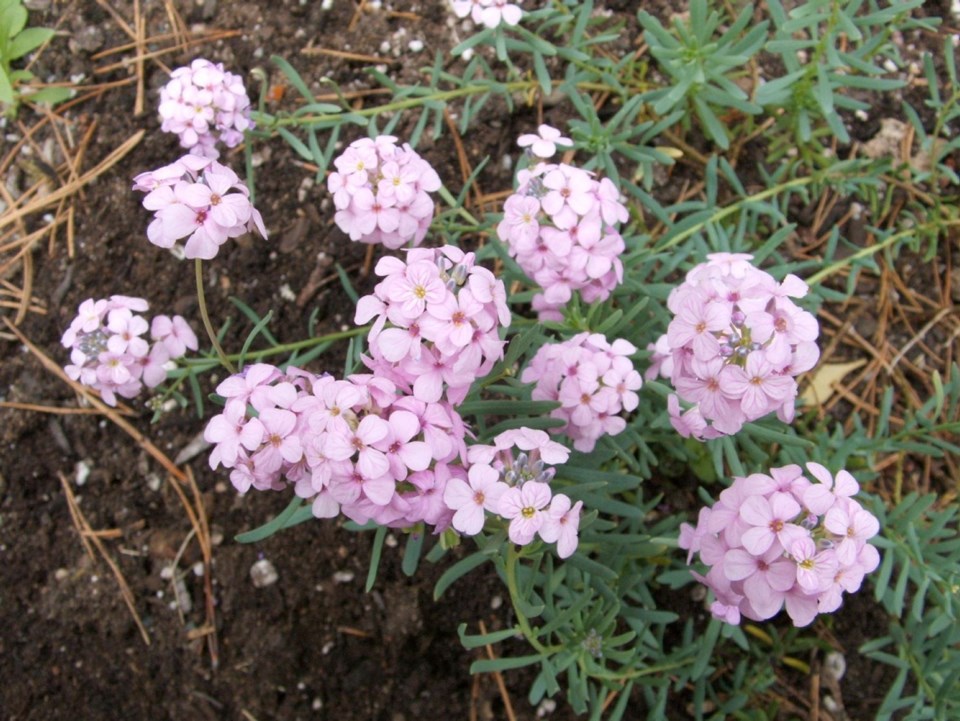Dear Helen: Do you know of a source for alpine plant seeds? D.A.
Chiltern Seeds in England (chilternseeds.co.uk) lists some rock plants and alpines among its enormously extensive A-to-Z listings of annual, perennial, shrub and tree seeds.
I’ve had success also with seeds from the alpine specialist Alplains (alplains.com) in Colorado. An acquainance who has for years been an avid grower of alpines put me on to this source.
One success story from Alplains seeds is the Turkish native Aethionema schistosum (stone cress), a 14-centimetre tall, rounded tuft of fine, blue-green foliage and, in May, sprays of dainty, pale pink flowers. My plants bloomed in their first spring in the garden, following a seeding and transplanting the previous year.
Among the most recent daphnes I’ve grown from seed Daphne alpina, a deciduous form growing 35-cm high, and D. kurdica, evergreen and 60-cm tall, are both thriving, each growing in a communal pot. The sturdy little plants in each container are ready for moving into individual pots, from which they’ll eventually find their way into the garden. Some will be given away.
D. alpina is listed in both the Alplains and Chiltern Seeds catalogues.
Dear Helen: Have you any idea what a big, C-shaped, whitish creature that I dug up out of a raised bed might be? It’s about the length of my thumb. K.G.
It’s probably a larva of the June beetle. Their white grubs grow up to five centimetres long. Your creature looks like the ones I dig up occasionally, and I also find the odd dried out shell of an adult 10-lined June beetle bearing characteristic white, lengthwise lines.
The larvae are usually a problem only in areas recently planted in grasses. Adults prefer such sites for laying eggs. In these places, potatoes and the roots of other plants will sometimes be damaged.
Where the grubs have been a problem it’s a good idea to dig the area over roughly several times before planting, to expose them to predation by birds and also to give you the chance to remove any you see.
Dear Helen: I recently had my eaves cleaned and the debris that came out of them looks like a lovely black leaf mulch. Should I use this as a mulch in garden beds or might it be harmful? The shingles are asphalt, and the debris is from oak and maple trees with some fir needles. C.H.
I don’t use a similar mix of materials from my eaves troxughs directly in the garden. Instead, I keep it dry, in pails, until a compost heap is emptied. Then, I use it as the base layer of the heap. That gives the material plenty of time to mellow and for all the microorganisms in the heap to work on it.
As I’ve emptied compost piles where eaves trough cleanings have been placed at the bottom, I have never seen any discernible trace of that original material, so well has it always morphed into the body of the finished compost.
Garden events
- Esquimalt meeting. The Esquimalt Garden Club will meet on Thursday at 7 p.m. in Esquimalt United Church, 500 Admirals Rd., corner of Admirals and Lyall. Use the door to the hall on Lyall Street.
- Master Gardeners reunion party. The Victoria Master Gardener Association will be celebrating its 15th anniversary with a party on June 23, at the Horticulture Centre of the Pacific. Current members, former members and invited guests are welcome at no cost, but registration is required by Saturday so that organizers can plan for light refreshments. Catch up with former classmates, instructors and colleagues while celebrating 15 years of community service. Register by email at [email protected].
- Cowichan garden tour. Cowichan Family Life hosts its annual tour of seven gardens in the Cowichan Valley on Sunday, 10 a.m. to 4:30 p.m. Tickets at $20 are available in many outlets from Victoria to Nanaimo. For the source nearest you, visit cowichanfamilylife.org or call 250-748-8281. Master gardeners will be on hand, and I’ll be in one of the gardens from noon to 3 p.m. to chat with visitors. Refreshments will be available at a Wilson Road garden. Proceeds go to Cowichan Family Life Association, which has provided community support services and counselling since 1970. They also offer literacy services with a Books ‘n’ Bubbles bus.



